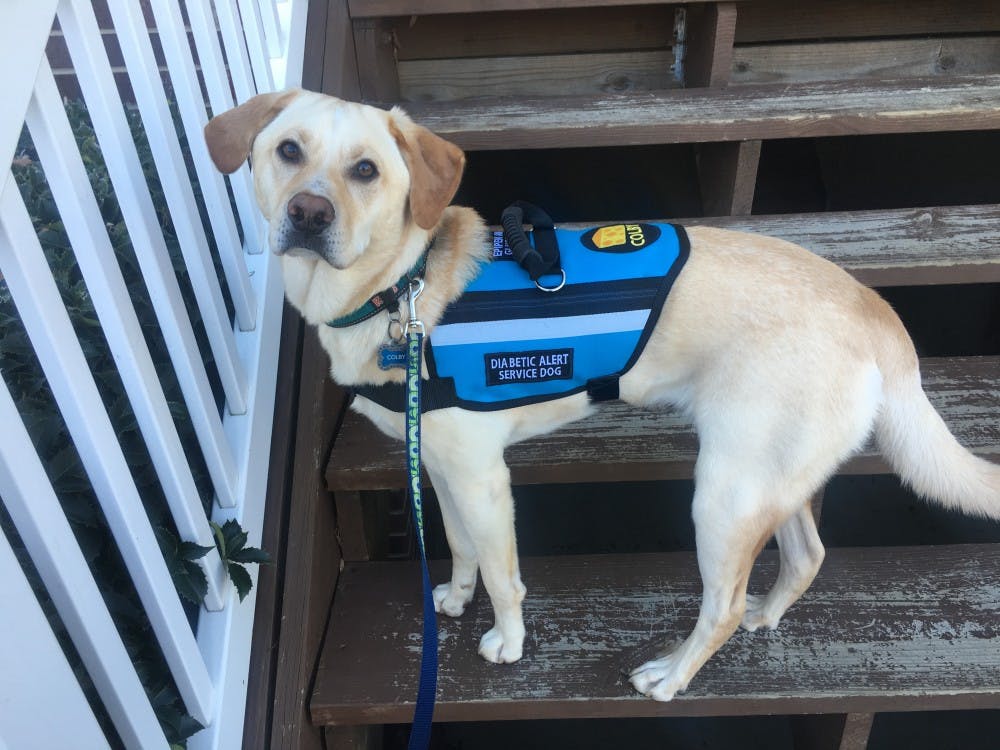The Americans with Disabilities Act (ADA) directly addresses the use of service dogs under Title III, labelled Public Accommodations.
Title III of the ADA has left a profound effect on not only hundreds of Americans across the country, but also several members of Elon University’s community.
Senior Allie Fishman is diagnosed with Insulin Dependent Diabetes and is a handler of a service dog named Colby.
According to the Civil Rights Division of the U.S. Department of Justice, service dogs are defined as “dogs that are individually trained to do work or perform tasks for people with disabilities.”
After 10 months of preparation at a service dog training program in North Carolina, Colby is now a Diabetic Alert Dog.
“On a daily basis, Colby can smell whether I have high or low blood sugar and warn me by licking or pawing me,” Fishman said. “These are services that he can do around campus, because legally he can follow me almost anywhere.”
While service dogs are protected by the ADA, emotional support animals (ESAs) are not. The difference between the two is something that Fishman believes some members of the Elon community do not understand.
“I don’t think that Elon students understand the difference between service dogs and ESAs,” Fishman said. “They provide completely different services, and the screening they go through are not the same.”
According to the ADA requirements, “dogs whose sole function is to provide comfort and emotional support do not qualify as service animals under the ADA.”

While ESAs are not protected by the ADA, Elon’s Disabilities Service Office works with students that need these animals on campus.
According to Susan Wise, the disabilities services director, there are about 50 - 60 registered ESAs on campus.
“Emotional support animals generally are approved to support students who have mental health issues,” Wise said. “Anxiety and depression are probably the main ones that we see here, but it is not unusual for someone to have several different diagnoses.”
While service dogs do not need to be registered with the Disabilities Services Office, ESAs do.
“There is a process; it is not something that automatically gets approved,” Wise said. “There is documentation that is required, and there needs to be a mental health care professional that is involved.”
Many students have gone through the proper documentation process required to register for an ESA, but Wise does agree that there is a misconception about the purpose of an ESA.
“ESAs are not the same as a service animal; there is sometimes a mix up with that,” Wise said. “Sometimes students get the idea it would be really great to have their pet on campus, as opposed to having a diagnosis that sort of fits with and makes an emotional support animal necessary.”
This misconception between an ESA and a service animal is not the only problem that Fishman has experienced.
According to Fishman, she has encountered what she believes are fake ESAs on Elon’s campus.
During her walks with Colby, Fishman said that she has met students that do not medically need an ESA, but simply wanted one and successfully had it registered. This is something Fishman believes personally affects her and Colby.
“Having but not needing an ESA hurts real service dogs,” Fishman said. “In the past, poorly trained ESAs have distracted Colby which kept him from doing his job.”
While this is frustrating for Fishman, the benefits of having Colby around greatly outweigh the negatives.
“During my freshman and sophomore year, I had two medical withdraws. I missed a lot of class for both diabetes and allergy-related reasons. I was in the hospital a lot. It was a lot more dangerous for me to live life,” Fishman said. “That all changed with Colby though. I went from having Cs and being out of class to having As, all because of Colby.
With the end of the year coming up, students hoping to get a service dog or an ESA should plan ahead.
In regards to students who do not know the details of the process, Wise said she “would encourage students to at least ask some questions.”
Fishman encourages students who need a service dog or an ESA to begin the process sooner rather than later.
“Having a service dog completely changed my experience here at Elon,” Fishman said. “Colby has saved my life, and I encourage people who really need service dogs to start looking into programs that suit their needs as soon as possible.”


